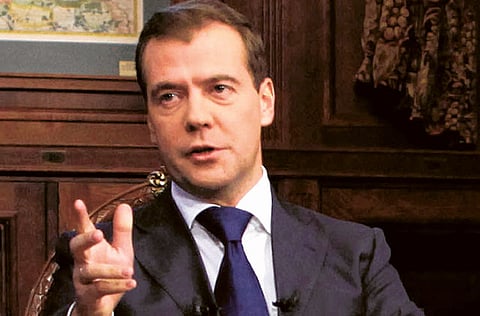'New Start' to an arms race
US has alienated Russia over a missile defence system that will not shield it against Iran or North Korea Russian warhead numbers had already dipped below the New Start limits earlier this year, but have now increased to 16 warheads above the treaty limits

Judging by the sound and fury coming from Russia lately, the United States might be witnessing the slow-motion destruction of US President Barack Obama's foreign policy crown jewel, the New Strategic Arms Reduction Treaty (New Start).
But no big surprise there, really: It was only a matter of time before the time bomb attached to the treaty — European missile defence — blew it up. Not only is Russia figuratively up in arms, but it has actually upped its nuclear arms lately, possibly re-igniting a cold-war-style arms race.
Under New Start, which entered into force in February, Moscow and Washington agreed to reduce their deployed strategic warheads to 1,550 each by 2018.
The problem with European missile defence is that while it's designed to counter Iran, the faster interceptors due to come online in 2018 will also be able to engage Russian warheads, upsetting this all-important perception of parity. Indeed, this interplay between strategic offence and defence was explicitly recognised in the preamble to the treaty.
For more than a year, Moscow and Washington have been negotiating on possible ways to cooperate on missile defence. The Russians would like to set up a joint European missile defence network with Nato, to make sure that the elements of the system — in a number of Nato countries, including Turkey — will not neutralise Russia's nuclear warheads. Nato, in contrast, has proposed the creation of two entirely separate systems that would exchange information. But the discussions have gone nowhere, and on November 23, President Dmitry Medvedev finally threw in the towel, announcing the end of negotiations.
Now Russia is warning it will deploy advanced conventional Iskander missile systems in its western and southern Kaliningrad and Krasnodar regions and neighbouring Belarus if there is no satisfactory closure on the missile defence issue. These missiles would be capable of targeting the Nato missile defence bases.
Russia has also been increasing its deployed strategic nuclear stockpile. Russian warhead numbers had already dipped below the New Start limits earlier this year, but have now increased to 16 warheads above the treaty limits. While the increase is not large, the trajectory of change is discouraging: Instead of continuing the decline in warhead numbers, Russia is now evidently increasing its deployed strategic stockpile.That more of the three-warhead RS-24 missiles are now being used — and fewer of the single warhead SS-25s — strongly suggests that this is a direct reaction to Nato missile defence, since the RS-24s were specifically developed in response to earlier missile-defence plans.
While New Start is a modest treaty in terms of strategic warhead reductions, it represents an important accomplishment for Russia and the United States: It re-establishes the data exchange on strategic-weapon systems and resets the US-Russia nuclear arms control relationship by building in a degree of predictability. It regularly brings together experts from both nations and increases transparency and decreases the possibility of misunderstanding.
Concessions to hawks
Huge funding increases for America's nuclear-weapons complex and ‘modernisation' programmes as well as the green-lighting of the flawed missile-defence system were offered as concessions to reluctant hawks to get their agreement to sign on the dotted line. Obama entered office not favouring the ill-tested missile defence system but changed his mind because he needed additional votes to pass New Start.
And this missile defence "time bomb" in New Start is what is now going off. The anticipated increase in security by slightly reducing strategic-nuclear-warhead numbers is now more than negated by the poisoning of relations with Russia over missile defence. It would possibly be worth tolerating the deteriorating relations with Russia if the planned missile defence system were actually effective against Iran or North Korea. In short, Washington has succeeded in alienating Russia over a missile defence system that will provide an ineffective defence against Iran or North Korea.
Arms control treaties should not be ratified at any cost. It would have been wiser to have no New Start treaty and no missile defence and no large funding increases for the nuclear-weapons complex, than having all three as we now do. In fact, signing such treaties casts Russia as an adversary and there are some sound arguments to avoid such neo-cold-war treaties in the future. The data-exchange and transparency measures could have been negotiated without a formal treaty — and without the domestic ransom.
There is no pressing need to involve Russia bilaterally in future arms reductions. In fact, the chief of the Strategic Plans and Policy Division of the Air Force has indicated that US nuclear-deterrent needs can safely be met by just 311 nuclear weapons. We ought to go to that number right away, and let Russia do whatever it wants. If Moscow wants to waste money on the upkeep of thousands of useless nuclear weapons, that's its problem. Russia is not our enemy — let's stop treating it like one.
— Christian Science Monitor
Dr Yousaf Butt, a nuclear physicist, serves as a scientific consultant for the Federation of American Scientists.


